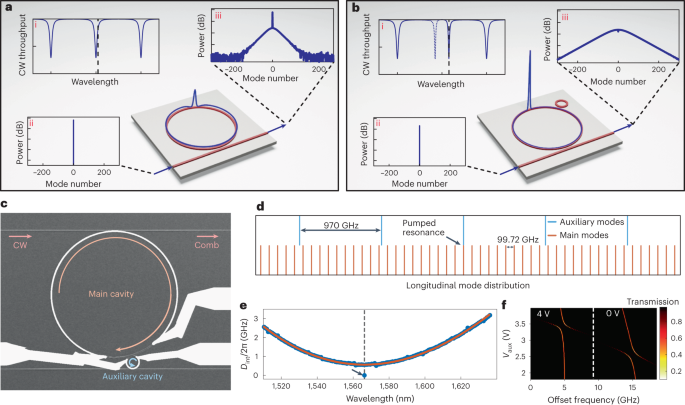2023-09-20 チャルマース工科大学
◆これにより、数百または数千の周波数から成る新しい光源が作成され、高性能レーザーテクノロジーがさまざまな市場に利用可能になります。これには自動運転のLiDARモジュール、GPS衛星、環境センシングドローン、データセンターなどの幅広い応用が含まれます。この技術は特許取得され、新しい会社Iloomina ABによって市場に導入される予定です。
<関連情報>
- https://news.cision.com/chalmers/r/new-method-makes-microcombs-ten-times-more-efficient,c3838471
- https://www.nature.com/articles/s41566-023-01280-3
ソリトンマイクロコムの非線形変換効率を超える Surpassing the nonlinear conversion efficiency of soliton microcombs
Óskar B. Helgason,Marcello Girardi,Zhichao Ye,Fuchuan Lei,Jochen Schröder & Victor Torres-Company
Nature Photonics Published:31 August 2023
DOI:https://doi.org/10.1038/s41566-023-01280-3

Abstract
Laser frequency combs are enabling some of the most exciting scientific endeavours in the twenty-first century, ranging from the development of optical clocks to the calibration of the astronomical spectrographs used for discovering Earth-like exoplanets. Dissipative Kerr solitons generated in microresonators currently offer the prospect of attaining frequency combs in miniaturized systems by capitalizing on advances in photonic integration. Most of the applications based on soliton microcombs rely on tuning a continuous-wave laser into a longitudinal mode of a microresonator engineered to display anomalous dispersion. In this configuration, however, nonlinear physics precludes one from attaining dissipative Kerr solitons with high power conversion efficiency, with typical comb powers amounting to ~1% of the available laser power. Here we demonstrate that this fundamental limitation can be overcome by inducing a controllable frequency shift to a selected cavity resonance. Experimentally, we realize this shift using two linearly coupled anomalous-dispersion microresonators, resulting in a coherent dissipative Kerr soliton with a conversion efficiency exceeding 50% and excellent line spacing stability. We describe the soliton dynamics in this configuration and find vastly modified characteristics. By optimizing the microcomb power available on-chip, these results facilitate the practical implementation of a scalable integrated photonic architecture for energy-efficient applications.



